Thanks for being here at the Austen Connection. You can see all of the Austen Connection conversations including the podcast here. If you are not signed up yet you can take a few seconds to sign up, below, to get all of the conversations dropped into your inbox. Thank you!
Hello Austen Connection friends,
Here in the Austen world I’ve noticed that many of you consider December and the holidays the time of romance: We see you with your lights, your lattes, your Hallmark binges - and more power to you.
Today’s post fits right into your romance dreams, and features our conversation with long-time romance and historical fiction author Vanessa Riley.
And it’s a podcast episode! So you can simply click Play above to stream this conversation, or you can listen on Apple or Spotify.
It also has suddenly struck me that I should tell you that you can, any time, simply go to the Austen Connection site and see many conversations like this one, plus podcast episodes, chats, and general #JaneAusten breakdowns, all free and waiting for you to curl up on the sofa with (don’t forget your cuppa tea). Enjoy!
And now, for our main feature of the week: Author Vanessa Riley.
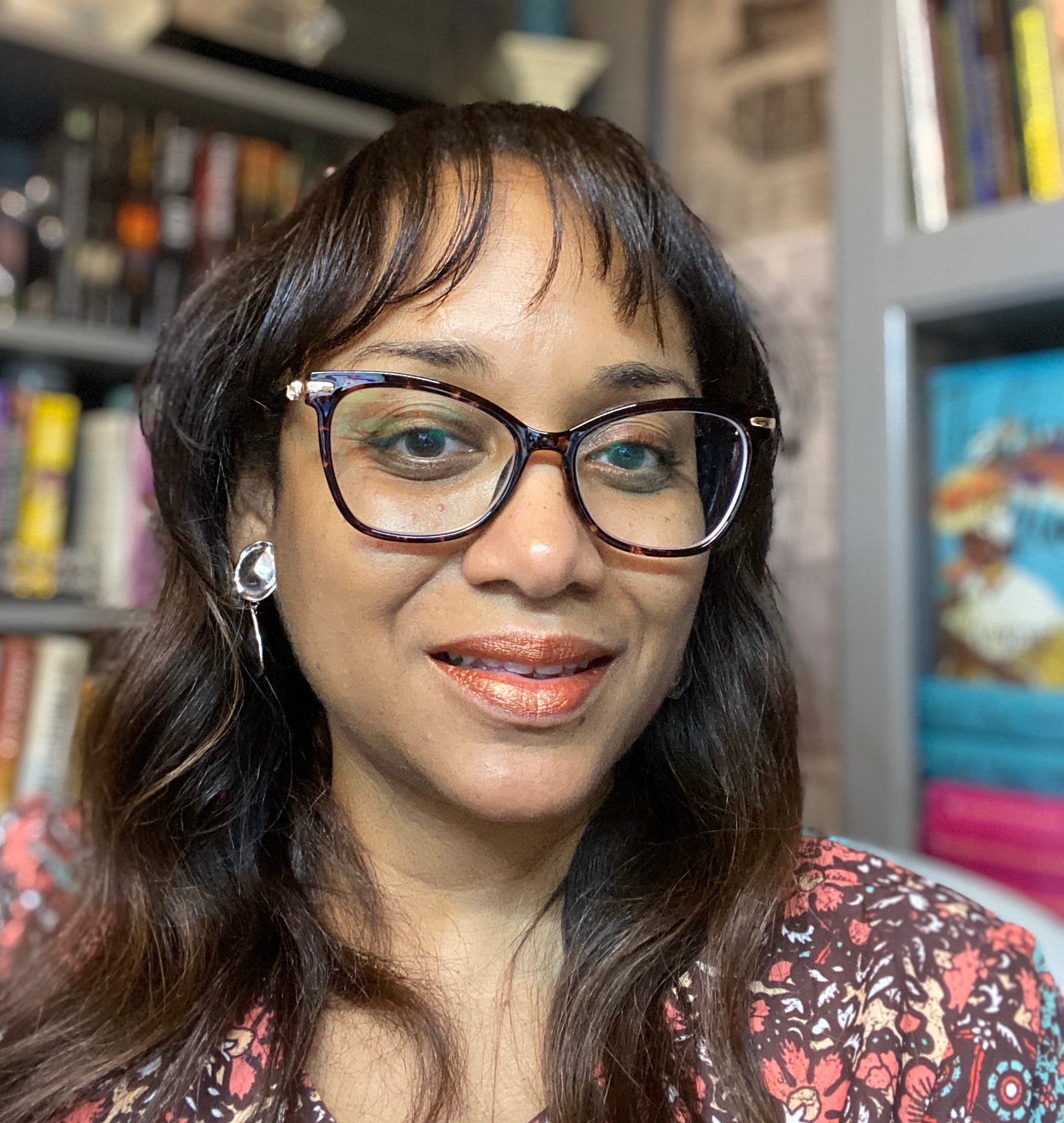
Dr. Riley - who has a PhD. from Stanford in mechanical engineering - has always found romance to be, as she says, a “happy place.” She tells us she began burning through Signet romances while an undergrad - as a break from “differential equations”!
And she was first inspired to discover the hidden histories of Black and biracial women of the Regency and colonial-era Caribbean when she came across that Jane Austen novel fragment we know as Sanditon. Austen’s biracial heiress of the West Indies - Miss Georgiana Lambe - started Vanessa Riley on this journey.
Dr. Riley’s latest novel Island Queen is all about the real life of Dorothy Kirwan Thomas. Dorothy, or “Doll,” Thomas was a Regency-era entrepreneur who became a dynamic figure in the early 1800s Caribbean. She was born into slavery on the island of Montserrat, and worked to buy her freedom and go on to become a wealthy landowner, leaving a legacy of children, and grandchildren, some of whom were educated in England. And she also had some interesting lovers along the way.
After being introduced to Austen’s Miss Lambe, Dr. Riley began digging for evidence of Regency-era and colonial women of color, and her research led her to the life of Dorothy Thomas, and eventually led to the novel Island Queen. The book has been optioned for the screen by two of the creatives behind the Netflix series “Bridgerton” - director Julie Anne Robinson and actor Adjoa Andoh, who plays Lady Danbury in the series, have teamed up with producer Victoria Fea.
The life of Dorothy Thomas is fascinating, and telling her story involves using a lot of words we might not associate with women surviving under colonial oppression - words like entrepreneurship, agency, manumission, wealth, power, romance. And perhaps the most important three words of all: Happily Ever After.
In this conversation for the Austen Connection podcast, Vanessa Riley talks about how she went from being a Math major, and then an engineer - to being a writer. She says if you love writing, that doesn’t leave you - no matter how many degrees you have.
Enjoy the conversation!
Plain Jane
What attracts you to the romance genre?
Vanessa Riley
The promise of the Happy Ever After. And you need that after you take a test for differential equations.
Plain Jane
Yes! Is this what got you through grad school?
Vanessa Riley
Yes. And undergrad is actually when I really started reading every Signet romance known to mankind, because they were nice and quick. And bananas - the plots were all over the place. And it was just something different to do. You know, engineering programs can be very intense … and sometimes you just want something [where] you know the ending. That you don't have to integrate under a curve. You just want to be assured of a happy place. And romance has always been that happy place.
Plain Jane
Yeah, so you like the structure. But a lot … can happen within that courtship plot. Do you find that you find intellectual challenges within that, that might be surprising to people who don't know the romance genre?
Vanessa Riley
For those who don't know the romance genre, writing romance is actually hard. Romance gets a really bad rap because they say it's formulaic. Well, it's formulaic because that's the promise that they've given to the reader. That's the only genre that you can pick up and get guaranteed to know that it's going to be safe. It's a happy ending. But how you get to that happy ending, how you vary your characters, tasks, and goals, and relationship status, [is] an emotional journey. That is what makes it exciting and different. And that's why there's no two stories that are the same. That is the fun of it. But in order to be that, to give people something different every time, you have to be extremely creative.
[W]riting romance is actually hard. Romance gets a really bad rap because they say it's formulaic. Well, it's formulaic because that's the promise that they've given to the reader. That's the only genre that you can pick up and get guaranteed to know that it's going to be safe. It's a happy ending. … But in order to be that, to give people something different every time, you have to be extremely creative.
And my friends who write romance, I write romance - these stories are just all over the map. They're different. They're engaging you, there's something for everyone. Now, there's something for everyone. That was not always the case. … But it's it's actually a difficult animal. And I find a lot of great writers start writing romance because once you can deliver how these two unique individuals are better together in a plausible way, and then you've taken them on a journey, you have the basis to write other types of fiction.
So it's a great training ground to be able to write romance.
Plain Jane
Well, you know who would agree with you is a great genre writer named Stephen King. I think we're finding that genre is harder than has been previously thought, like you just said. Did you struggle to get it? Did you kind of take it on as a challenge? Or do you feel like it kind of came naturally for you, because you just wanted that HEA, and you just figured out how to get there.
Vanessa Riley
The plotting has always been, I would say, my strength. My mother didn't allow a lot of different types of books in the house. But we had Shakespeare … we had all these different types of things. And so I would kind of junkie out on TV, and I would rewrite episodes of “Dallas.”
Plain Jane
Not everybody, not every kid, is doing that!
Vanessa Riley
So I used to entertain my brothers by coming up with these little stories. And they would be, you know, different variants of TV shows or something that I wanted to change the ending because it wasn't happy: J.R., you know, realizes that Sue Ellen was great. And they got back together and lived happily ever after. And he stopped doing all these bad things.
Plain Jane
So you learned, you learned plotting from J.R. and Sue Ellen …
Vanessa Riley
And structure from Shakespeare. So there we go - the perfect match!
Plain Jane
What attracts you to the Regency period, specifically and Regency stories?
Vanessa Riley
I think because of the nature of the books that my mother made sure that we read, I have an older voice. It's … these worlds always fascinated me. I am a history buff. Another degree I almost got was a minor in history when I was at Penn State. It just - Western Civ particularly - was extremely interesting, the foundations of the world, traveling through Roman history. … I was geeking on it. I loved it.
And then when we get to the Romanticism periods, and I stumble upon this author named Jane Austen, and I'm reading it and I love Pride and Prejudice, and we get to Mansfield - Oh, she's got a little political streak going on in here! And then I get the Sanditon and the wealthiest woman in the book is a … from the West Indies. My father's from Trinidad and Tobago. It's just … like, “Oh, this now makes sense, why I'm here!”
To tell these stories, and as you do more research, and you realize how big the Caribbean part of the narrative of this time period is, and how it has been completely obliterated or obscured, it just makes you say, “Where are my people? Where's the representation?” I mean, all the economies of the world, 80 percent of the GDP is coming from the sugar trade. … But that's all the stolen labor from the West Indies that is making sugarcane and indigo and cotton and coffee, all from all of the colonies in the West Indies. And yet you read romance, you read a lot of historical fiction, and this is not mentioned. You will get the heroic Duke. But you won't learn that his generational wealth is coming from … Dominica or plantations in Demerara. And you forget this piece.
You know, Jane Austen: We think of her as historical. She's a contemporary writer. So she's writing what she saw during that day. And when you get to this Miss Lambe, you realize that West Indian girls and boys, particularly biracial ones, are being sent to London and Glasgow and Ireland for education. Because everyone understands education is going to make the difference in your socioeconomic background. It's going to change the world. And they're sending their kids there.
To tell these stories, and as you do more research, and you realize how big the Caribbean part of the narrative of this time period is, and how it has been completely obliterated or obscured, it just makes you say, ‘Where are my people? Where's the representation?’
And so this mixing and mingling happens, but none of that is recorded. It's very scantily recorded.
Plain Jane
I love it that you bring up the Jane Austen and Sanditon, which I know was an influence for this book Island Queen … an influence for your research. But you just mentioned something. I mean, it is amazing Jane Austen … shows us the foundations of the economic underpinnings of Britain in her world. And she also is showing us the debates going on, but she's doing it - I feel like she's doing it - so subtly. But she did introduce Miss Lambe. It's such a shame, tragic that we don't get to see what she did with Sanditon. But at least we got that much. At least we know that she was bringing in this character. I love it that you say that Miss Lambe is the wealthiest character in the novel. That's left out. And what strikes me, what I want to know, Dr. Riley, is [as] we get into the life of Dorothy Thomas, this one woman that you're exploring the life of through Island Queen, what are some of the things that you've learned about free women of color in colonial Caribbean era?
Vanessa Riley
One, that they exist. Because when I started doing research, I just had a concept of Miss Lambe. And I didn't really understand whether, you know, was Jane just being progressive? Because, you know, abolition during this timeframe is a very hot topic of conversation. … So she's getting both sides of these arguments. Is this just an author being progressive, trying to attack a social issue? Or is she more telling what's happening of her timeframe?
So I go on the search, and I literally find Dorothy Kirwan Thomas because of a sketch that the cartoonist, editorial cartoonist Gilroy draws. I find this picture of Prince William Henry - aka future King William IV - he's lovingly embracing a Black woman. Now, that in itself is remarkable. You have a person in aristocracy and he's in an affair with this Black woman. …
And, unfortunately, women are very poorly documented in history. We were very lucky to have Anne Frank's diary. You don't often come across these - even Queen Victoria's diary has been edited and sanitized so that we don't see some of the things that happened after her beloved Albert passed away. So I had to follow the rich man. I found Prince William. And I find him in the West Indies, and his boys, and they're kicking it up and breaking brothels in Jamaica. They broke up one so badly they had to pay for it the next day. He is is acting a fool in every port he comes into until he gets to Dominica. When he gets to Dominica he's different. His friends are writing letters saying he's with that woman again. … And then I finally get one that says he's dancing with Dorothy Kirwan at the mulatto ball. And we finally had a name. And I thought this was going to be another obscure thing, but then you start researching and you find Dorothy Kirwan Thomas, her will is archived in the UK. Why would a Black woman's will be archived in the UK? And you keep reading and then you find that she's opened businesses in Demerara and in Grenada and in Dominica. And then you find she's had these children. Now that was another thing. Our reproductive history as a woman is our history. So pinning down that she's had children in Montserrat, she's had children in Demerara. … What would make a woman move, particularly the move when she goes from Dominica, where she has a successful business, to Grenada? What's making her move? So you get these unwinding of these stories.
But this woman is phenomenal, that she's able to just restart her life in these various colonies. She does it with children. And she's very protective and caring about these children. And then in Demerara, you find a whole group of women, which I affectionately call the Entertainment Society, these women of color, who have made their money through entertainment. So they're [doing] that through housekeepers, through cooking and cleaning, general huckstering, which is the taking and selling goods made by enslaved people, and selling those to visitors to the colony at higher prices and whatnot. And she just builds this fabulous life. And she, it's just amazing that we don't know her name.
Some of us have struggles taking our kids to Walmart, in the backseat of our minivan. And she's taking 17 [kids] from Demerara … all the way up to Glasgow, Scotland.
Because there’s this world of money that has opened up the world to her, she wants her grandkids to see this, and to feel this, and she's paying for the education of these children. And she's funding schools for the education of colored girls in London. I mean, this is an enormously fabulous woman who rose against all kinds of odds - that she was enslaved, she bought her freedom. She bought the freedom of her family, she made it a mission to whenever she could find family, she would buy their their freedom. For her to be completely wiped off the books, to me, blows my mind.
Plain Jane
Well, let me talk to you a little bit about all of this in your stories. And writing romance. So when you're writing the life of Dorothy Kirwan Thomas, you’re writing the courtship plot in a setting that involves colonialism and violence. And you - and Austen also introduces - assault. But the stakes are higher for your heroine, when you're writing in colonialism and colonial Britain, Demerara. It's more violent, it's more oppressive. What is it like writing a romance within those [settings] because this is something that's kind of new territory, right?
Vanessa Riley
Well, this is more of a biographical historical fiction, that has romantic elements. I'm writing her real life. There's no guarantee of a happy ending when you write real life. And so that kind of throws that construct out. But at the same time, these men as I did the history, they are important in her in her life. They change things, they shape her. She has to grow past the problems that they also bring to her life.
And there's a thing that I know as an author … is a misconception that a Black woman during this timeframe was not desirable, was not something sought after, wasn't precious. And I really want to defeat that myth. Because everything that I see, is when two people find each other, they find each other regardless of time, period, space, race, etc.
And so as I looked at the challenges of these men, I wanted that to convey [that]. Because Dorothy to me was someone who lit up a room, even when she was poor, before she had money. There was something about her that drew people, [a] magnetic personality that drew people, men, everybody was drawn to this woman. And I wanted that to be conveyed. … So no matter how hard it gets, you're comforted to know that she's found a way to survive. I have romance readers coming to me, reading my first historical fiction. I wanted you guys to feel safe. Because that's what you expect, as you're saying, in a romance.
And so, I wanted to make sure that you get the concept that these men are in her life for a reason. But she chose the reason. Some of it was trifling. Dorothy was not a saint, I will tell you that right now. Not a saint at all. Because that often happens with particularly Black women, when you do something extraordinary: You all of a sudden are superhuman, you never feel pain. You can vanquish any enemy. Dorothy was very human, she felt a lot of pain. She went through a lot of suffering. But she had a will to survive that I haven't read about in a long, long time.
And I wanted that to be conveyed. And I wanted you to see moments where she is being treasured, where she's being sought after, because I believe that was the type of personality she had. So I get to use all my romantic bones to build a story to make it convincing. So that you will feel her heart breaking, when her heart really breaks.
Plain Jane
You mentioned the presence of love and joy, in Dorothy Kirwan Thomas’s life and other Black lives from history. Can you talk a little bit about love and joy and the need for those elements and these stories and the lack of them and some of the stories that people sometimes expect?
Vanessa Riley
Yeah. You know, typically, when you think of a story that touches on enslavement, you think of the darkness of that. And that should never be discounted. One person asked me, because there's a part in the book, where Dorothy is forced to, in order to be a member of society, in order to not get pushed out of business like everybody else who's objected, she had to turn to owning slaves. It was to maintain her seat at the table. I firmly believe this is one of her wrong decisions. I think one that she wrestled with, but she justified in her head that it's better for me to have a seat at the table, to make sure these people are protected, than not having a seat. And other people could be run out of business. And you know, they may go to debtors' prison, … but [she] could possibly be re-enslaved. And I do believe that's the one line she would never cross, she'd never wanted to go back there. So she did whatever she needed to do. But somebody said, “Why didn't you just leave that out? You know because the book is kind of long, you can leave that.”
No: I don't want history whitewashed. I cannot whitewash history.
And I also want to make sure people don't deify, make these women who are doing extraordinary things, into something they weren't. They were practical women. They were smart. But they were also human and fallible. And they could do wrong things. They can do stupid things. They could do things on the spur of the moment. They had agency but they still had a soul and still could do things wrong as much as they could do things right. And I don't want to paint this false image.
But what often happens is you get stories that are just focused on the pain. … People want to include the enslavement story in their stories, because they want to show how their characters survive, or they want to show people coming in and rescuing the poor slaves … It's pain porn, right? There has to be a reason why you show the violence.
And in my world, for me because I am part of the romance community, I want my people, my readers safe. So that's what I show you. They are safe. They survived.
So as even I show you darkness, you are going to be protected. You're going to be okay, reading this. Dorothy made it. You can read through this and get through the hard parts. But then I also balance the hard parts with the joyful parts - when she's with her children. But she's taking these fabulous trips when she dresses her girls and they go to this fabulous ball and that is a moment that I think cannot be glossed over and it needs to be shown. Because there's pride in that moment. There is joy in that, and she's sharing that moment with her [children], which I think just speaks to who this was.
And so there's not enough Black joy. That's why I'm a big advocate of Black romance, romance in general because you just need to be safe and Happy Ever After. And I'm just so thankful that now Happy Ever After is for everyone.
Thank you for being here, friends. Check out more conversation like this one at The Austen Connection - and you can sign up to have conversations like this one drop right into your inbox every week.
You can also drop us a line by simply replying here, or connect on Twitter at @AustenConnect, or on Insta and Facebook at @austenconnection. And go ahead and weigh in with any thoughts you have on this conversation, right here:
Stay tuned for more talk about romance, holiday films, and Jane Austen - in the coming weeks. We’re looking forward to spending the holidays with you.
Get some rest, read some fiction, drink some tea, and stay in touch, friends.
Yours truly,
Plain Jane
Cool links for you
Dr. Vanessa Riley’s website:
https://vanessariley.com/
Dr. Riley mentions the work of scholar Gretchen Gerzina - here’s more on Dr. Gerzina, and here’s the Austen Connection’s podcast episode with Dr. Gerzina
Enterprising Women: Gender, Race and Power in the Revolutionary Atlantic https://ugapress.org/book/9780820353876/enterprising-women/
UCL’s Center for the Study of the Legacies of British Slavery: https://www.ucl.ac.uk/lbs/person/view/6334
Here’s Carole V. Bell’s review of Island Queen for the New York Times, which is where we discovered this book
The Austen Connection first talked with Vanessa Riley for the Christian Science Monitor - here’s that article


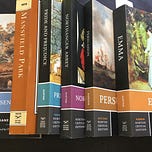

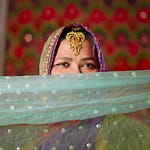

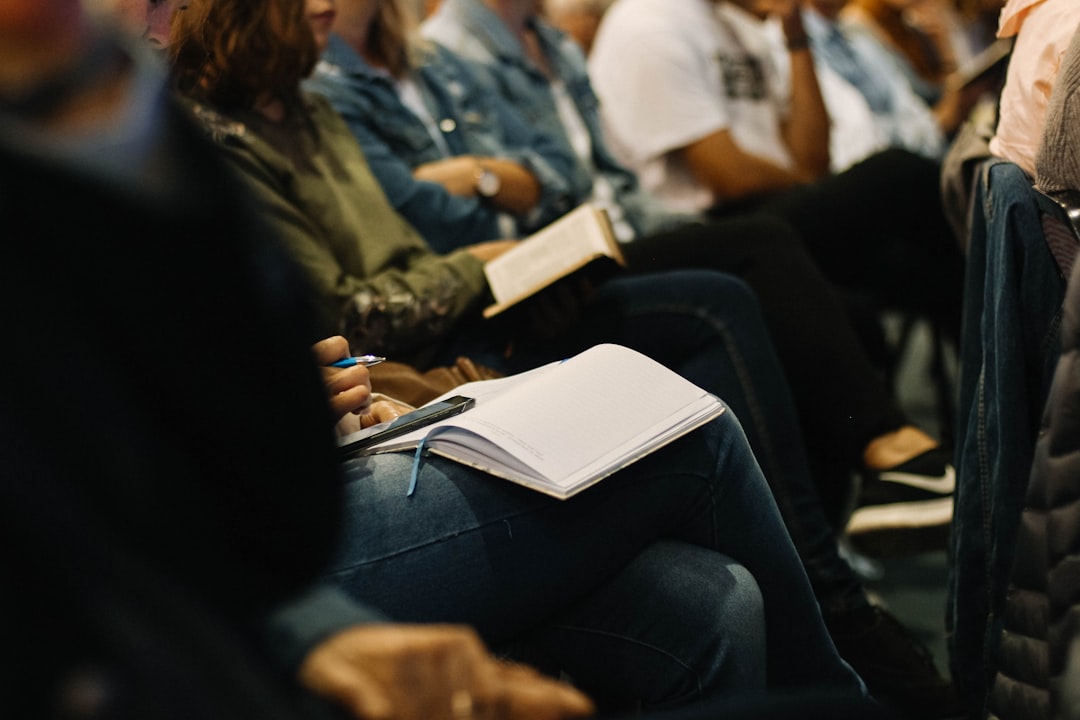


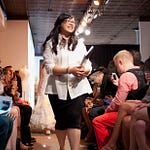
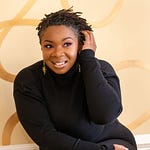
The Podcast - S2, Ep5: Regency women of color finding romance, making history